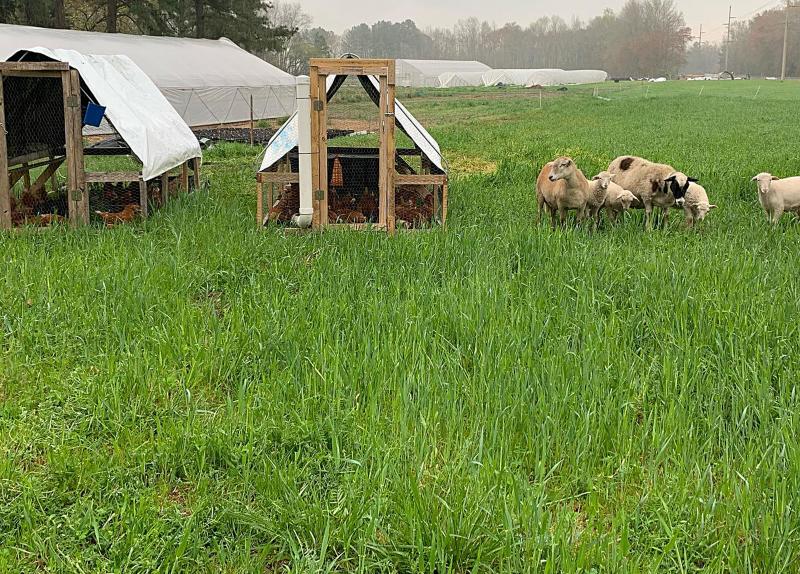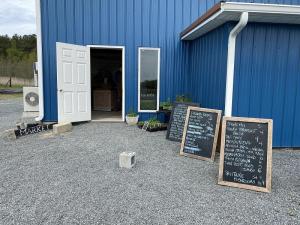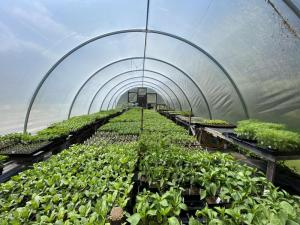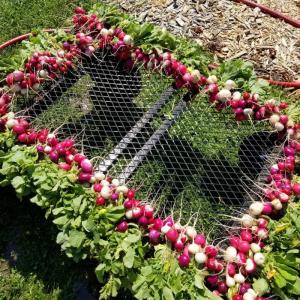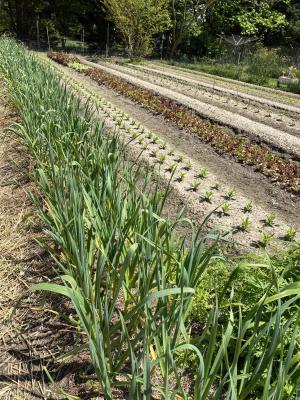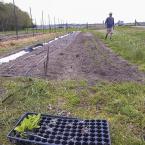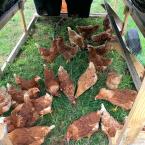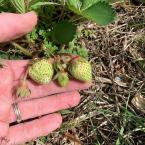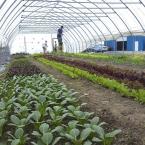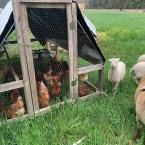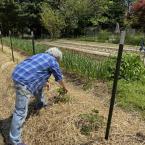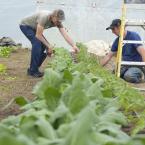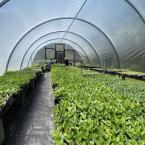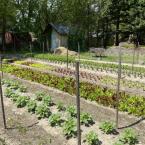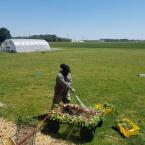Almost immediately after Gov. John Carney ordered everyone to shelter in place, local farmers who offer community-supported agriculture programs or at-the-farm produce pickup during the winter months saw their memberships jump.
As more restrictions were established and fears of entering grocery stores weighed on the minds of shoppers, the uptick in demand for produce direct from the source grew. And then it grew some more.
“It has increased 1,000 percent, if that is possible!” said Rob Dick, co-owner of Totem Farms in Milton. At the new sales building at the farm, he has had to scale back the hours to only two days a week – not only to allow time to plant, but also to rest. He now has help from Lewes’ Heirloom restaurant employees in the fields and in the store.
Over in Laurel, Dittmar Farms owners Zach and Jenny Dittmar have not changed what they are planting for the season. “But we have increased the number of meat birds we are raising and the number of laying hens we raise. We sold out of our last flock of chickens in just a week,” said Jenny.
The Dittmar farm does its own bird processing and has access to the mobile processing unit from Delaware State University. “We would not be able to process our chickens due to the shutdowns and distancing rules for large processing plants if this were not the case,” Jenny said.
Still, CSA numbers alone have not exceeded expectations for this year. “Some new members are on board because of the possible disruption to the grocery store food chain; we are still taking sign-ups for the season,” Zach said. “It’s pre-sales and farm pickups that have dramatically increased.”
The recent outrage from farmers and community members disputing the Agriculture Department’s decision that farmers markets are events – not essential businesses – also underscores public demand for a steady supply of fresh produce right from the source.
Hattie Allen sends out an email on Sunday for her delivery and pickup service, and within eight hours she closes down the ordering, a process that used to go on for three days. To keep up with demand, she has hired more staff and increased hours for part-time employees.
“My customers want to feed themselves, so they are buying vegetable plants and flowers too,” said Allen. “I have 48 people per day twice a week buying plants. Two people arrive every 15 minutes; they bring a list and stay in the car. It’s hard to meet the demand. I used to have 1,000 emails going out; now I am sending 1,500 each week.”
Adkins Farm in Dagsboro also has seen an increase in sales. “Our sales are up approximately 40 percent over this time last year. We have had a lot of interest in curbside pickup that we offer,” said owner Ashley Godwin.
“The CSA membership has increased due to people being concerned about the availability of produce, although there isn’t any produce that we haven’t been able to get. But quantities are limited,” Godwin said. The farm will launch a full, online listing so people can order and then designate a time for curbside pickup.
The popular farmers markets are a key source of income for many farms, but farmers are also adapting to deliveries and other ways to serve customers.
Ray’s Produce and Flowers, usually open at the Brush Factory in Lewes, has kicked into a delivery system. The weekly list is on a Facebook page every Monday, with orders due by 10 a.m. on Wednesday, and deliveries take place from Thursday to Saturday.
With farmers markets now set to open with restrictions and social distancing in place, farmers say the outlet allows an option if onsite sales decrease. However, some find it is easier to stay on the farm if customers continue to visit.
An early spring storm left a Nash Veggies hoop house in tatters. A GoFundMe showed how much love the community had for the farm. “The response was incredible, and I can replace it three times over,” Josh Nash said.
If the Delaware Department of Agriculture didn't come through with a plan by May 1, he and his partner Curtis Hamm decided they would sell on the farm this year. “I love my farmers market, but if shoppers are limited, it will reduce the traffic and we won’t be able to make money we need for next year,” he said.
Nash calls himself a first-generation farmer. It is year six for market gardening, and the third for the CSA. “It’s high stress because you always owe, and it’s a bad feeling if you can’t fill those boxes,” he said. Once the pandemic hit, within four days, more shares were sold than in two months’ time before. “I think this is going to be a revolutionary year for market farms. People are beginning to understand food supply chains,” Nash said.
He added that the shutdown has had an opposite effect on volunteerism, however: “Last year, I had people who wanted to be on the farm, hang out, and bag lettuce, but now there are fewer people, and I have to be careful who comes to help,” he said.
He is excited to see people trying to garden for themselves. “I’m a big fan of backyard gardening, and it gives them firsthand knowledge of the difficulties we face,” Nash said.
Farmers are notoriously resilient and proud people. They work through the worst weather to harvest crops to feed community members. With many restaurants being closed, people are eating at home regularly, and local farmers are proving themselves to be vital elements of the new dinner table.











